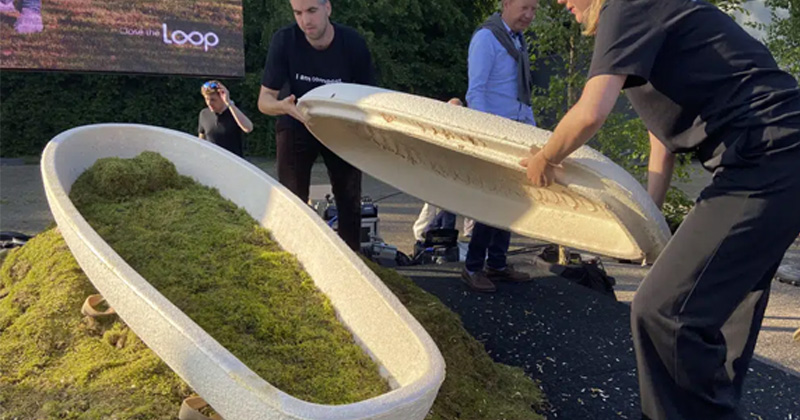Delft, Netherlands - A Dutch intrepid inventor is now “growing” coffins by putting mycelium, the root structure of mushrooms, together with hemp fiber in a special mold that, in a week, turns into what could basically be compared to the looks of an unpainted Egyptian sarcophagus.
And while traditional wooden coffins come from trees that can take decades to grow and years to break down in the soil, the mushroom versions biodegrades and delivers the remains to nature in barely a month and a half.
In our 21st century, when the individual spirit can increasingly thrive way beyond the strictures of yore, death and funerals are all so often still hemmed in by tradition that may fall far short of the vision of the deceased or their loved ones.
"We each embrace diverse cultures and have unique preferences for burial practices worldwide. However, a significant portion of us, perhaps a majority, desire a departure from traditional norms that have persisted unchanged for several decades or even centuries," remarked Shawn Harris, an American investor involved with Loop Biotech, a company that manufactures coffins. Loop Biotech claims to offer a solution for individuals seeking a more holistic approach to life and death, aligned with their deeply held beliefs, while prioritizing environmental consciousness and nature conservation.
During a recent presentation, Bob Hendrikx, the 29-year-old founder, adorned in an "I am compost" T-shirt, shared his extensive research on nature, particularly focusing on mushrooms. He discovered that mushrooms are nature's most efficient recyclers, leading him to contemplate our participation in the natural cycle of life. Consequently, he embarked on the journey of cultivating coffins made from mushroom-based materials. These coffins can be adorned with moss for burial ceremonies, further integrating nature.
For those who prefer cremation, Loop Biotech also offers urns that nurture the growth of a sapling. These urns can be buried alongside the tree, allowing the ashes to enrich the soil and contribute to the tree's vitality when the urn eventually decomposes.
In an interview, Hendrikx expressed a transformative perspective, rather than perceiving death as the end, he stated, 'Instead of: 'we die, we end up in the soil and that's it,' Now there is a new story: we can enrich life after death, and you can continue to thrive as a new plant or tree.' He emphasized that this concept introduces a fresh narrative, allowing us to become part of something greater than ourselves.

The coffins are priced at 995 euros (equivalent to over $1,000) each, while the urns cost 196.80 euros ($212).
To emphasize the integration of nature in these funeral practices, Loop Biotech has formed a partnership with Natuurbegraven Nederland (Nature Burials Netherlands). This collaboration involves utilizing six specially designated habitats within protected parks where remains can be interred.
At present, Loop Biotech has the capacity to produce and supply 500 coffins or urns per month, delivering them across Europe. Hendrikx noted the growing popularity of these eco-friendly alternatives in the Nordic countries, stating, "It's the Northern European countries where there is more consciousness about the environment and also where there's autumn. So they know and understand the mushroom, how it works, how it's part of the ecosystem."